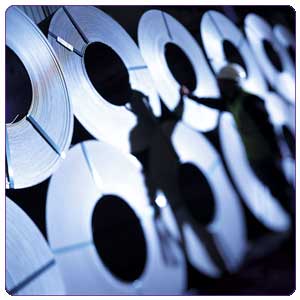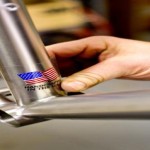Bill demands American-made steel in state projects: Requirement could benefit Iron Range, workers
Legislation that would require contractors to use American-made steel for all government construction projects in Minnesota passed its first committee Wednesday at the Capitol.
The bill, which cleared the House Government Operations Committee by a voice vote, would require all steel used in construction projects funded with any taxpayer dollars to be made in the U.S., whether the projects are initiated by the state or local governments.
The effort to boost U.S.-made steel would directly benefit Minnesota iron ore mining industry, which supplies most of the raw material — taconite — to make domestic steel.
“Eighty percent of the first-pour steel made in the U.S. comes from iron ore from Minnesota’s Iron Range,” Craig Pagel, president of the Iron Mining Association of Minnesota, told the News Tribune. “More steel means more iron ore and more jobs. … This helps us compete with the (below-cost) steel-dumping by China and other nations that cost us jobs here.”
The requirement would apply to virtually all types of steel — rolled, forged, extruded, drawn, cast, fabricated or other — in nearly all types of public works projects, from bridges to buildings, roads, airports, rail and waterways.
State and local government agencies would be required to include the U.S.-made requirement in all contracts with private builders.
Not only are the nation’s largest blast furnaces using Minnesota ore to make steel, but more Minnesota products, such as iron nuggets, are being developed to feed so-called mini-mill electric arc furnaces.
John Rebrovich, a Steelworker officer whose family has mined iron ore on the Range for more than 70 years, said the bill will “promote growth and expand the tax base.” The bill also has support of the new Iron Ore Alliance of U.S. Steel workers and management at the company’s two Minnesota taconite plants. No one testified against the bill on Wednesday.
The bill is sponsored by state Rep. Carly Melin, DFL-Hibbing, with most Iron Range lawmakers as co-sponsors.
“This levels the playing field for steel and iron ore here at home, where we have labor laws and environmental laws and pay a living wage,’’ Melin said after the hearing. “This is about jobs. And we have both labor and management at the table in support.”
The Senate version, SF 318, is sponsored by state Sen. Dave Tomassoni, DFL-Chisholm.
The bill does have exceptions, including if there isn’t enough U.S.-made steel product available or if the American-made products are more expensive by 15 percent or more than the foreign competition.
The bill now goes on the House Capital Investment Committee.
The steel requirement would follow a state law approved last year requiring the majority of all steel used in the proposed Minnesota Vikings stadium to be made in the U.S.
Chisholm-Hibbing Airport
Melin sponsored another bill heard in the same committee Wednesday that would provide $5 million in state bonding money for improvements at Range Regional Airport shared by Chisholm and Hibbing. The state money would be used to match federal and IRRRB grants for airport improvements.
The airport hopes to make improvements to the terminal, including security checkpoints and adding a covered entryway for passengers to board planes.
Shaun Germolus, executive director of the Chisholm-Hibbing Airport Authority, told the committee that “we’ve outgrown our facilities” and that the airport was key to regional economic development.
No vote was taken, but the provision could be added to the Legislature’s bonding construction package later in the session – if a bonding bill is approved.
The effort to boost U.S.-made steel would directly benefit Minnesota iron ore mining industry, which supplies most of the raw material — taconite — to make domestic steel.
“Eighty percent of the first-pour steel made in the U.S. comes from iron ore from Minnesota’s Iron Range,” Craig Pagel, president of the Iron Mining Association of Minnesota, told the News Tribune. “More steel means more iron ore and more jobs. … This helps us compete with the (below-cost) steel-dumping by China and other nations that cost us jobs here.”
The requirement would apply to virtually all types of steel — rolled, forged, extruded, drawn, cast, fabricated or other — in nearly all types of public works projects, from bridges to buildings, roads, airports, rail and waterways.
State and local government agencies would be required to include the U.S.-made requirement in all contracts with private builders.
Not only are the nation’s largest blast furnaces using Minnesota ore to make steel, but more Minnesota products, such as iron nuggets, are being developed to feed so-called mini-mill electric arc furnaces.
John Rebrovich, a Steelworker officer whose family has mined iron ore on the Range for more than 70 years, said the bill will “promote growth and expand the tax base.” The bill also has support of the new Iron Ore Alliance of U.S. Steel workers and management at the company’s two Minnesota taconite plants. No one testified against the bill on Wednesday.
The bill is sponsored by state Rep. Carly Melin, DFL-Hibbing, with most Iron Range lawmakers as co-sponsors.
“This levels the playing field for steel and iron ore here at home, where we have labor laws and environmental laws and pay a living wage,’’ Melin said after the hearing. “This is about jobs. And we have both labor and management at the table in support.”
The Senate version, SF 318, is sponsored by state Sen. Dave Tomassoni, DFL-Chisholm.
The bill does have exceptions, including if there isn’t enough U.S.-made steel product available or if the American-made products are more expensive by 15 percent or more than the foreign competition.
The bill now goes on the House Capital Investment Committee.
The steel requirement would follow a state law approved last year requiring the majority of all steel used in the proposed Minnesota Vikings stadium to be made in the U.S.
Chisholm-Hibbing Airport
Melin sponsored another bill heard in the same committee Wednesday that would provide $5 million in state bonding money for improvements at Range Regional Airport shared by Chisholm and Hibbing. The state money would be used to match federal and IRRRB grants for airport improvements.
The airport hopes to make improvements to the terminal, including security checkpoints and adding a covered entryway for passengers to board planes.
Shaun Germolus, executive director of the Chisholm-Hibbing Airport Authority, told the committee that “we’ve outgrown our facilities” and that the airport was key to regional economic development.
No vote was taken, but the provision could be added to the Legislature’s bonding construction package later in the session – if a bonding bill is approved.
SOURCE: Duluth News Tribune





There should be no exceptions, how do you put a number on American jobs?